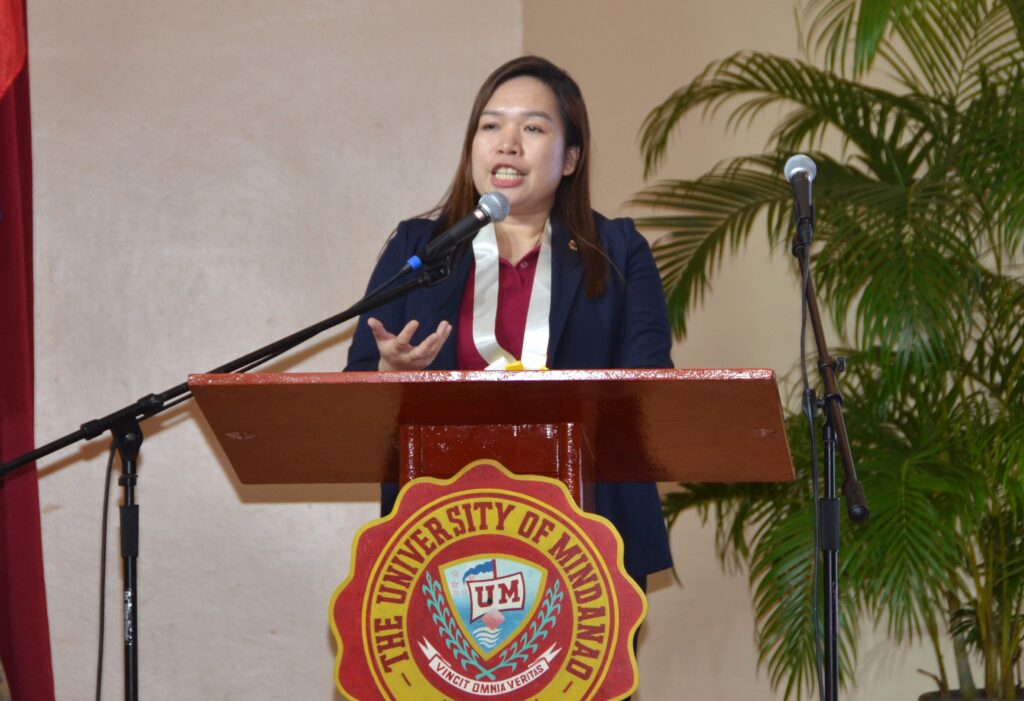What Filipinos need to know about biotechnology
Text and Photos by Henrylito D. Tacio
Some Filipinos already have a basic understanding of biotechnology, yet many perceive it primarily as a modern concept. Discussions often revolve around topics such as Bt Corn, golden rice and Bt talong.
Nevertheless, it is important to recognize that crop biotechnology has ancient roots, as pointed out by Dr. Vivencio Mamaril during a symposium held at the University of Mindanao recently. He refers to this historical approach as traditional biotechnology.
Dr. Mamaril, who is a technical consultant with the Department of Agriculture, noted that traditional biotechnology primarily encompasses the production of various food items, including cheese, bread, and wine.

Examples of these can be found in fermented products such as beer, patis (fish sauce), suka (vinegar), and bagoong (shrimp or fish paste).
In contrast, today’s generation is more acquainted with modern biotechnology, which involves genetic engineering techniques. This process is characterized by the artificial manipulation, modification, and recombination of DNA or other nucleic acid molecules to alter an organism or a population of organisms.
“Biotechnology provides farmers with tools that can make production cheaper and more manageable,” said Dr. Mamaril. “For example, some biotechnology crops can be engineered to tolerate specific herbicides, which make weed control simpler and more efficient.”
Dr. Mamaril was one of the invited speakers during the Regional Crop Biotechnology Symposium held in Davao City under the auspices of the Department of Agriculture- Crop Biotechnology Center (DA-CBC).
It was the fifth symposium conducted by the center since 2023 but was the first ever to be held in Davao City. The event occurred on November 13-14, coinciding with the country’s observance of National Biotechnology Week, which is celebrated during the third week of November.
Aside from Dr. Mamaril, other invited speakers were Dr. Reynante L. Ordonio, Dr. Chosel Lawagon, Jess Bryan M. Alvariño, Sabiniano Q. Lamban, Dr. Jill Villanueva, and Richard Bangoy.
Dr. Ordonio, a senior science research specialist at the DA-Philippine Rice Research Institute, talked about new breeding techniques (NBTs). He defined it as “a suite of modern biotech tools that facilitate the precise development of new plant varieties with desired traits.”

NBTs are built upon the public acceptability of conventional plant breeding techniques (that is, mutagenesis) and the precision of GM technology. “(The technique is) an improvement over conventional breeding and traditional GM technology.”
Alvariño, a senior science research specialist at the Philippine Rubber Research Institute’s division for genetic resources and improvement, discussed the conservation and management of genetic resources in rubber cultivation.
He characterized genetic materials as those derived from plants that possess actual or potential value and utility for both current and future generations. He emphasized that cultivating various varieties contributes to a consistent food supply year-round and promotes a nutritionally balanced diet. Furthermore, he noted that the diversity of applications not only enhances income but also offers resources for medicine, fuel, and textiles.
Dr. Lawagon, director of UM’s Center of Green Nanotechnology Innovations for Environmental Solutions, focused her talk on biotechnology and nanotechnology in agricultural waste management.

She believed agricultural waste management is the key solution to the problem of climate change. Among those that she cited were waste reduction, recycling, and reuse (as “these techniques can turn waste into valuable resources like organic fertilizers or biogas), improved manure and fertilizer management (“help reduce greenhouse gas emissions”), and rotational grazing )“help maintain healthy soil to store carbon”)
Dr. Lawagon also highlighted the role of nanomaterials in waste-to-resource conversion. For one, they enhanced nutrient absorption. “Nanomaterials can be engineered to carry nutrients more efficiently, promoting better nutrient absorption in plants and reducing nutrient loss in the soil,” she explained.
Lamban, a science research specialist at the Davao Research Center of Philippine Coconut Authority shared his experience on biological control strategies for managing key insect pests in coconut. “Pest are inevitable but we can prevent and manage it,” he said.
Dr. Villanueva, of the Philippine Rubber Research Institute, discussed the biotech-based disease management in rubber. Most of the rubbers (99%) grown in the Philippines can be found in Mindanao, she said.
“With the increasing number of hectares being planted with rubber in the country, pests and diseases are becoming a major constraint in production that results in increased production cost and losses,” she stressed.
Bangoy, Bayer Crop Science’s regional field testing lead for Philippines/Indonesia, did an excellent presentation on transformative corn innovations for regenerative agriculture. The Philippines, he said, is the first country in Asia to plant bioengineered corn.
“Where do we go from here?” he asked. The answer is regenerative agriculture. “Increasing agricultural production, farm incomes and resilience in a changing climate while protecting and renewing nature – produce more with less, while restoring more,” he emphasized.
The CBC, which convened the two-day symposium that was attended by experts, scientists, researchers, students, and farmers, is one of the three biotech centers under the agriculture department.
The CBC acts as a driving force in the advancement and application of modern biotechnologies within the agricultural sector. It organizes and executes the research, development, and outreach initiatives of the DA-Biotech Program. Additionally, it offers capacity-building services in biotechnology to a network of research institutions focused on development, facilitating the adoption of modern crop biotechnologies.
The research for development areas are molecular genetics, genetic engineering and gene editing, tissue culture, microbial biotechnology, diagnostics, bioinformatics and computational biology, and natural products, natural ingredients, and value-adding.
Among the biotech products CBC promotes are: Bt corn (resistant to Asian corn borer), malusog rice (vitamin A-rich rice), biofertilizers (natural fertilizers), submergence-tolerant rice (high-yield rice capable of enduring transient complete submergence), and ELISA kits (DNA-based detection kits for crop diseases).

